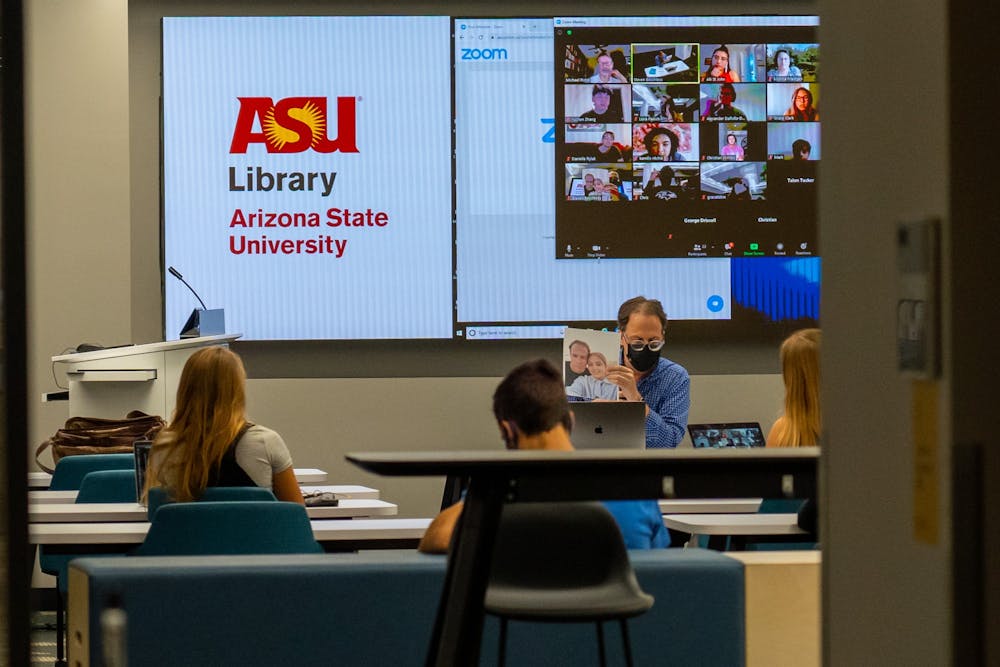ASU faculty will not be able to conduct their ASU Sync classes solely through Zoom without approval from the provost, a University spokesperson said in an email.
ASU Sync classes provide students the option to attend the class either in person or remotely through Zoom. For many classes this past semester, the decision to conduct instruction solely through Zoom was one not made by faculty but through student preference.
During the fall semester, a vast majority of students opted to attend solely through Zoom due to fears of COVID-19, ease of attendance and a better learning environment when everyone attended virtually, faculty and students have said. ASU President Michael Crow said in a Dec. 2 meeting with The State Press only around 20% of students were on campus for classes each day last semester.
University officials have encouraged faculty to teach in person this upcoming semester, citing a lack of faculty on campus as a reason for the low in-person student turnout in the fall.
READ MORE: ASU will encourage faculty to teach in person for spring semester
“We are making commitments to students to offer in-person options, circumstances permitting, and want to uphold those commitments to the best of our ability,” wrote the spokesperson.
Jenny Brian, a senior lecturer at Barrett, The Honors College, said by the third week of the fall semester, all of her students stopped attending classes in person and attended only through Zoom, leading her to teach remotely.
Brian, a member of the Community of Care Coalition, said the provost’s decision to give faculty less choice and less flexibility “to keep themselves and their peers safe” is “entirely the wrong move at this moment when we have out of control community spread” in Arizona.
“This is the only communication we've had from the administration for a while,” Brian said. “As the pandemic rages, it is disappointing and seems kind of out of touch. The entire way the University has structured this year was about giving students choice, but now it feels like we are only giving a particular kind of student choice.”
In a press briefing Wednesday, Biodesign Institute Executive Director Joshua LaBaer said Arizona is seeing a “consistent and continued rise in overall cases” and a rise in hospitalizations.
The University spokesperson said ASU is continuing “to closely monitor the spread of COVID-19 in Arizona” but has made no changes to its modes of operations for classes or University Housing for the spring semester.
LaBaer said the University is encouraging all students to be tested for COVID-19 and is requiring all students living on campus to be tested.
READ MORE: ASU will have stricter returning COVID-19 testing policies for spring semester
“What we have found in the past, is that when we maintain our sort of regular schedule random testing of our student population (is) that we managed to get the numbers down quite a bit among those students who are on campus,” he said.
The spokesperson wrote the use of ASU’s daily health check and community members following public health protocols last semester showed “the spread of the virus can be managed.”
For the spring semester, ASU will increase the amount of random testing to 25% of all students each week, the spokesperson wrote, but did not respond in time for publication on how the random testing will be enforced. Last semester, University officials said not enough students were complying with the random testing protocol when fewer students were being selected to be tested.
“Our data indicates that COVID-19 spread last semester was not the result of classroom or workplace activity, rather it stemmed from social interactions where public health protocols were not followed,” the spokesperson wrote. “Given that we offer a very structured learning and working environment where public health protocols are followed, we are hopeful that we can continue in our current mode of operations for the spring semester.”
UA announced Tuesday it would conduct most classes virtually and have only “essential courses” in person to begin its spring semester, according to a press release.
LaBaer said he will be teaching a course this semester, but he will be teaching it virtually.
“I would like to back into the classroom, obviously,” he said. “A lot of my course involves discussion, but at the beginning, right now, I think it's safer to stay virtual.”
Brian said she is worried about the start of the spring semester after seeing the spike in cases last semester that occurred when students returned to campus when community spread in the state was far lower.
“I'm more worried than I was in August, which was pretty terrifying,” she said. “My classes this semester are bigger. I'll be in the classroom more. And we see just astonishing (COVID-19) numbers. And so now that I have to be in a classroom with students for three hours every couple of days, that's scary.”
Reach the reporter at wmyskow@asu.edu and follow @wmyskow on Twitter.
Like The State Press on Facebook and follow @statepress on Twitter.
Continue supporting student journalism and donate to The State Press today.

Wyatt Myskow is the project manager at The State Press, where he oversees enterprise stories for the publication. He also works at The Arizona Republic, where he covers the cities of Peoria and Surprise.




